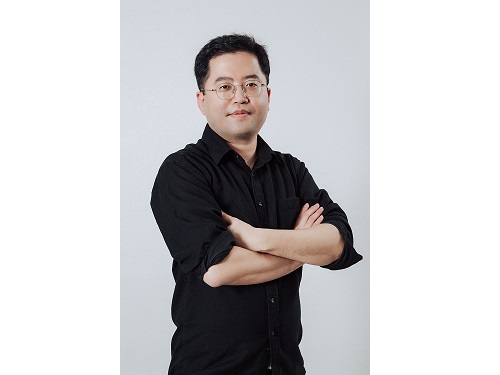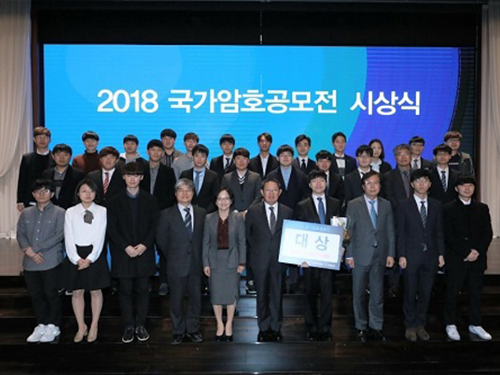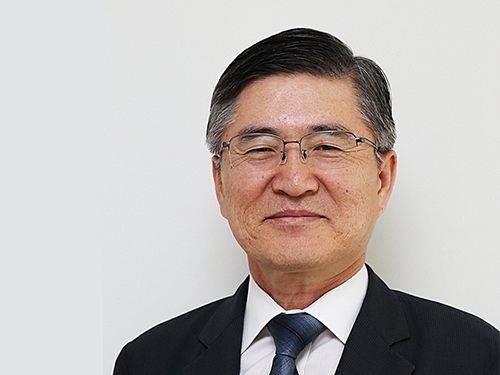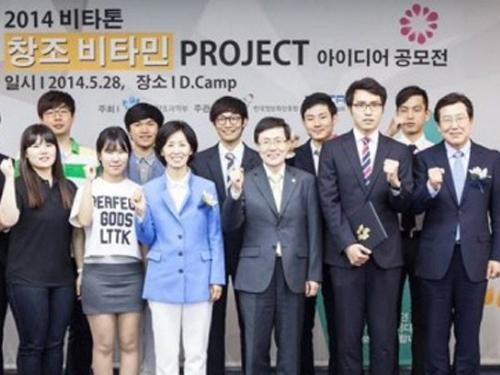information+security
-
 The World’s First Hacking-preventing Cryptographic Semiconductor Chip
With the dramatic increase in the amount of information exchanged between components or devices in the 5G/6G era, such as for the Internet of Things (IoT) and autonomous driving, hacking attacks are becoming more sophisticated. Consequently, enhancing security functions is essential for safely transmitting data between and among devices.
On February 29th, a KAIST research team led by Professors Yang-gyu Choi and Seung-tak Ryu from the School of Electrical Engineering announced the successful development of the world's first security cryptographic semiconductor.
The team has developed the Cryptoristor, a cryptographic transistor based on FinFET technology, produced through a 100% silicon-compatible process, for the first time in the world. Cryptoristor is a random number generator (RNG) with unparalleled characteristics, featuring a unique structure comprising a single transistor and a distinctive mechanism.
In all security environments, including artificial intelligence, the most crucial element is the RNG. In the most commonly used security chip, the Advanced Encryption Standard (AES), the RNG is a core component, occupying approximately 75% of the total chip area and more than 85% of its energy consumption. Hence, there is an urgent need for the development of low-power/ultra-small RNGs suitable for mobile or IoT devices.
Existing RNGs come with limitations as they lack compatibility with silicon CMOS processes and circuit-based RNGs occupy a large surface area.
In contrast, the team’s newly developed Cryptoristor, a cryptographic semiconductor based on a single-component structure, consumes and occupies less than .001 of the power and area compared to the current chips being used. Utilizing the inherent randomness of FinFETs, fabricated on a Silicon-on-Insulator (SOI) substrate with an insulating layer formed beneath the silicon, the team developed an RNG that unpredictably produces zeroes and ones.
< Figure 1. Conceptual diagram of the security cryptographic transistor device. >
Generally speaking, preventing hackers from predicting the encrypted algorithms during data exchanges through mobile devices is pivotal. Therefore, this method ensures unpredictability by generating random sequences of zeroes and ones that change every time.
Moreover, while the Cryptoristor-based RNG research is the world's first of its kind without any international implementation cases, it shares the same transistor structure as existing logic or memory components. This enables 100% production through rapid mass production processes using existing semiconductor facilities at a low cost.
Seung-il Kim, a PhD student who led the research, explained the significance of the study, stating, "As a cryptographic semiconductor, the ultra-small/low-power random number generator enhances security through its distinctive unpredictability, supporting safe hyperconnectivity with secure transmissions between chips or devices. Particularly, compared to previous research, it offers excellent advantages in terms of energy consumption, integration density, and cost, making it suitable for IoT device environments."
This research, with master’s student Hyung-jin Yoo as the co-author, was officially published in the online edition of Science Advances, a sister journal of Science, in February 2024 (research paper title: Cryptographic transistor for true random number generator with low power consumption).
This research received support from the Next-Generation Intelligent Semiconductor Technology Development Project and the Core Technology Development Project for the National Semiconductor Research Laboratory.
2024.03.07 View 8918
The World’s First Hacking-preventing Cryptographic Semiconductor Chip
With the dramatic increase in the amount of information exchanged between components or devices in the 5G/6G era, such as for the Internet of Things (IoT) and autonomous driving, hacking attacks are becoming more sophisticated. Consequently, enhancing security functions is essential for safely transmitting data between and among devices.
On February 29th, a KAIST research team led by Professors Yang-gyu Choi and Seung-tak Ryu from the School of Electrical Engineering announced the successful development of the world's first security cryptographic semiconductor.
The team has developed the Cryptoristor, a cryptographic transistor based on FinFET technology, produced through a 100% silicon-compatible process, for the first time in the world. Cryptoristor is a random number generator (RNG) with unparalleled characteristics, featuring a unique structure comprising a single transistor and a distinctive mechanism.
In all security environments, including artificial intelligence, the most crucial element is the RNG. In the most commonly used security chip, the Advanced Encryption Standard (AES), the RNG is a core component, occupying approximately 75% of the total chip area and more than 85% of its energy consumption. Hence, there is an urgent need for the development of low-power/ultra-small RNGs suitable for mobile or IoT devices.
Existing RNGs come with limitations as they lack compatibility with silicon CMOS processes and circuit-based RNGs occupy a large surface area.
In contrast, the team’s newly developed Cryptoristor, a cryptographic semiconductor based on a single-component structure, consumes and occupies less than .001 of the power and area compared to the current chips being used. Utilizing the inherent randomness of FinFETs, fabricated on a Silicon-on-Insulator (SOI) substrate with an insulating layer formed beneath the silicon, the team developed an RNG that unpredictably produces zeroes and ones.
< Figure 1. Conceptual diagram of the security cryptographic transistor device. >
Generally speaking, preventing hackers from predicting the encrypted algorithms during data exchanges through mobile devices is pivotal. Therefore, this method ensures unpredictability by generating random sequences of zeroes and ones that change every time.
Moreover, while the Cryptoristor-based RNG research is the world's first of its kind without any international implementation cases, it shares the same transistor structure as existing logic or memory components. This enables 100% production through rapid mass production processes using existing semiconductor facilities at a low cost.
Seung-il Kim, a PhD student who led the research, explained the significance of the study, stating, "As a cryptographic semiconductor, the ultra-small/low-power random number generator enhances security through its distinctive unpredictability, supporting safe hyperconnectivity with secure transmissions between chips or devices. Particularly, compared to previous research, it offers excellent advantages in terms of energy consumption, integration density, and cost, making it suitable for IoT device environments."
This research, with master’s student Hyung-jin Yoo as the co-author, was officially published in the online edition of Science Advances, a sister journal of Science, in February 2024 (research paper title: Cryptographic transistor for true random number generator with low power consumption).
This research received support from the Next-Generation Intelligent Semiconductor Technology Development Project and the Core Technology Development Project for the National Semiconductor Research Laboratory.
2024.03.07 View 8918 -
 Professor Sang Kil Cha Receives IEEE Test-of-Time Award
Professor Sang Kil Cha from the Graduate School of Information Security (GSIS) in the School of Computing received the Test-of-Time Award from IEEE Security & Privacy, a top conference in the field of information security.
The Test-of-Time Award recognizes the research papers that have influenced the field of information security the most over the past decade. Three papers were selected this year, and Professor Cha is the first Korean winner of the award.
The paper by Professor Cha was published in 2012 under the title, “Unleashing Mayhem on Binary Code”. It was the first to ever suggest an algorithm that automatically finds bugs in binary code and creates exploits that links them to an attack code.
The developed algorithm is a core technique used for world-class cyber security hacking competitions like the Cyber Grand Challenge, an AI hacking contest.
Starting with this research, Professor Cha has carried out various studies to develop technologies that can find bugs and vulnerabilities through binary analyses, and is currently developing B2R2, a Korean platform that can analyze various binary codes.
2022.06.13 View 6349
Professor Sang Kil Cha Receives IEEE Test-of-Time Award
Professor Sang Kil Cha from the Graduate School of Information Security (GSIS) in the School of Computing received the Test-of-Time Award from IEEE Security & Privacy, a top conference in the field of information security.
The Test-of-Time Award recognizes the research papers that have influenced the field of information security the most over the past decade. Three papers were selected this year, and Professor Cha is the first Korean winner of the award.
The paper by Professor Cha was published in 2012 under the title, “Unleashing Mayhem on Binary Code”. It was the first to ever suggest an algorithm that automatically finds bugs in binary code and creates exploits that links them to an attack code.
The developed algorithm is a core technique used for world-class cyber security hacking competitions like the Cyber Grand Challenge, an AI hacking contest.
Starting with this research, Professor Cha has carried out various studies to develop technologies that can find bugs and vulnerabilities through binary analyses, and is currently developing B2R2, a Korean platform that can analyze various binary codes.
2022.06.13 View 6349 -
 KAIST Shows Strong Performance in Crypto Contest Korea 2018
(Awardees at the ceremony for Crypto Contest Korea 2018)
A paper titled “Indifferentiability of Truncated Random Permutations” by PhD candidate Wonseok Choi and MS candidate Byeonghak Lee (under Professor Jooyoung Lee) from the KAIST Graduate School of Information Security (GSIS) won first place in Crypto Contest Korea 2018. Byeonghak Lee became a repeat winner since his paper titled “Tweakable Block Ciphers Secure Beyond the Birthday Bound in the Ideal Cipher Model” also received an award at Crypto Contest Korea 2017.
The contest, hosted by the Korea Cryptography Forum, the Korea Institute of Information Security & Cryptology, and the National Security Research Institute and sponsored by the National Intelligence Service, was held for promoting cryptography in Korea. The total prize money is fifty million won with ten million won going to the first place winners.
The contest was divided into three divisions: paper, problem solving, and idea. Among the three divisions, first place came from the paper division only.
Besides first place, KAIST students showed outstanding performance in the contest. PhD candidate Seongkwang Kim received participation prize while he also received special prizes with MS candidate Yeongmin Lee. The hacking club GoN (under Professor Sang Kil Cha), comprised of undergraduate students from the GSIS was awarded the grand prize in the division of problem solving.
The award ceremony was held during the Future Crypto Workshop 2018 on November 15. The awards ceremony for Crypto Expert Korea 2018 were also held there, and PhD candidate Ji-Eun Lee from the School of Computing and Byeonghak Lee received awards, the grand prize and runner-up prize respectively.
2018.11.27 View 9909
KAIST Shows Strong Performance in Crypto Contest Korea 2018
(Awardees at the ceremony for Crypto Contest Korea 2018)
A paper titled “Indifferentiability of Truncated Random Permutations” by PhD candidate Wonseok Choi and MS candidate Byeonghak Lee (under Professor Jooyoung Lee) from the KAIST Graduate School of Information Security (GSIS) won first place in Crypto Contest Korea 2018. Byeonghak Lee became a repeat winner since his paper titled “Tweakable Block Ciphers Secure Beyond the Birthday Bound in the Ideal Cipher Model” also received an award at Crypto Contest Korea 2017.
The contest, hosted by the Korea Cryptography Forum, the Korea Institute of Information Security & Cryptology, and the National Security Research Institute and sponsored by the National Intelligence Service, was held for promoting cryptography in Korea. The total prize money is fifty million won with ten million won going to the first place winners.
The contest was divided into three divisions: paper, problem solving, and idea. Among the three divisions, first place came from the paper division only.
Besides first place, KAIST students showed outstanding performance in the contest. PhD candidate Seongkwang Kim received participation prize while he also received special prizes with MS candidate Yeongmin Lee. The hacking club GoN (under Professor Sang Kil Cha), comprised of undergraduate students from the GSIS was awarded the grand prize in the division of problem solving.
The award ceremony was held during the Future Crypto Workshop 2018 on November 15. The awards ceremony for Crypto Expert Korea 2018 were also held there, and PhD candidate Ji-Eun Lee from the School of Computing and Byeonghak Lee received awards, the grand prize and runner-up prize respectively.
2018.11.27 View 9909 -
 Professor Kwangjo Kim Named as Fellow of IACR
Professor Kwangjo Kim of the Graduate School of Information Security has been selected as a fellow of the International Association for Cryptologic Research (IACR).
The IACR has honored outstanding scholars who have achieved academic excellence in cryptologic research since 2004. He is the first Korean scholar to receive an IACR fellowship.
The IACR, established in 1981, is responsible for organizing international cryptologic conferences every year including the three major cryptologic academic conferences Eurocrypt, Crypto, and Asiacript. The IACR also sponsors workshop series such as the Theory of Cryptography Conference (TCC), the Workshop on Fast Software Encryption (FSE), the Public Key Cryptography Workshop (PKC), and Cryptographic Hardware and Embedded Systems (CHES).
Professor Kim, an internationally acclaimed scholar in the fields of cryptology and information security theory and its applications, was recognized for his outstanding academic achievements and leadership. He has made significant contributions to cryptology in Korea by hosting Asiacript in 1996 and 2001 as well as CHES in 2014. During his 34 years of academic activities, he has published more than 80 SCI journal papers and garnered more than 20,000 citations.
Professor Kim served on the board of the directors of the IACR from 2000 to 2004 and was the chairperson of the Asiacript Steering Committee from 2005 to 2008. He is on the editorial board of the online journal Cryptography.
Professor Kim said, “I am so humbled and honored to be named as a fellow of such a prestigious academic association. I will continue to strive to assist highly educated information security personnel with further research in cryptology.”
2017.03.16 View 9795
Professor Kwangjo Kim Named as Fellow of IACR
Professor Kwangjo Kim of the Graduate School of Information Security has been selected as a fellow of the International Association for Cryptologic Research (IACR).
The IACR has honored outstanding scholars who have achieved academic excellence in cryptologic research since 2004. He is the first Korean scholar to receive an IACR fellowship.
The IACR, established in 1981, is responsible for organizing international cryptologic conferences every year including the three major cryptologic academic conferences Eurocrypt, Crypto, and Asiacript. The IACR also sponsors workshop series such as the Theory of Cryptography Conference (TCC), the Workshop on Fast Software Encryption (FSE), the Public Key Cryptography Workshop (PKC), and Cryptographic Hardware and Embedded Systems (CHES).
Professor Kim, an internationally acclaimed scholar in the fields of cryptology and information security theory and its applications, was recognized for his outstanding academic achievements and leadership. He has made significant contributions to cryptology in Korea by hosting Asiacript in 1996 and 2001 as well as CHES in 2014. During his 34 years of academic activities, he has published more than 80 SCI journal papers and garnered more than 20,000 citations.
Professor Kim served on the board of the directors of the IACR from 2000 to 2004 and was the chairperson of the Asiacript Steering Committee from 2005 to 2008. He is on the editorial board of the online journal Cryptography.
Professor Kim said, “I am so humbled and honored to be named as a fellow of such a prestigious academic association. I will continue to strive to assist highly educated information security personnel with further research in cryptology.”
2017.03.16 View 9795 -
 KAIST studnets win 2014 Creative Vitamin Project Competition
A team of KAIST students have won the grand prize for the “2014 Creative Vitamin Project Competition” held on May 28, 2014 in Seoul. The event was co-hosted by the Ministry of Science, ICT and Future Planning, National Information Society Agency, and Korea IT Convergence Technology Association. The Creative Vitamin Project is the Korean government’s initiative to grow the Korean economy and generate job creation by applying science and technology, information and communications technology in particular, to the existing industry and social issues.
The winners were Hyeong-Min Son, a student in the master’s program in the Department of Civil and Environmental Engineering, KAIST and Su-Yeon Yoo, a Ph.D. student from the Graduate School of Information Security, KAIST.
Son and Yoo proposed a sustainable crop protection system using directional speakers. This technique not only efficiently protects crops from harmful animals, but also effectively guides the animals outside the farmland.
Kwang-Soo Jang, the Director of the National Information Society Agency, said, “This competition provides an opportunity to develop public consensus and interest in the Creative Vitamin Project. We hope that through the participation of all citizens, the project can become an instrument to realizing the creative economy.”
2014.06.18 View 12446
KAIST studnets win 2014 Creative Vitamin Project Competition
A team of KAIST students have won the grand prize for the “2014 Creative Vitamin Project Competition” held on May 28, 2014 in Seoul. The event was co-hosted by the Ministry of Science, ICT and Future Planning, National Information Society Agency, and Korea IT Convergence Technology Association. The Creative Vitamin Project is the Korean government’s initiative to grow the Korean economy and generate job creation by applying science and technology, information and communications technology in particular, to the existing industry and social issues.
The winners were Hyeong-Min Son, a student in the master’s program in the Department of Civil and Environmental Engineering, KAIST and Su-Yeon Yoo, a Ph.D. student from the Graduate School of Information Security, KAIST.
Son and Yoo proposed a sustainable crop protection system using directional speakers. This technique not only efficiently protects crops from harmful animals, but also effectively guides the animals outside the farmland.
Kwang-Soo Jang, the Director of the National Information Society Agency, said, “This competition provides an opportunity to develop public consensus and interest in the Creative Vitamin Project. We hope that through the participation of all citizens, the project can become an instrument to realizing the creative economy.”
2014.06.18 View 12446